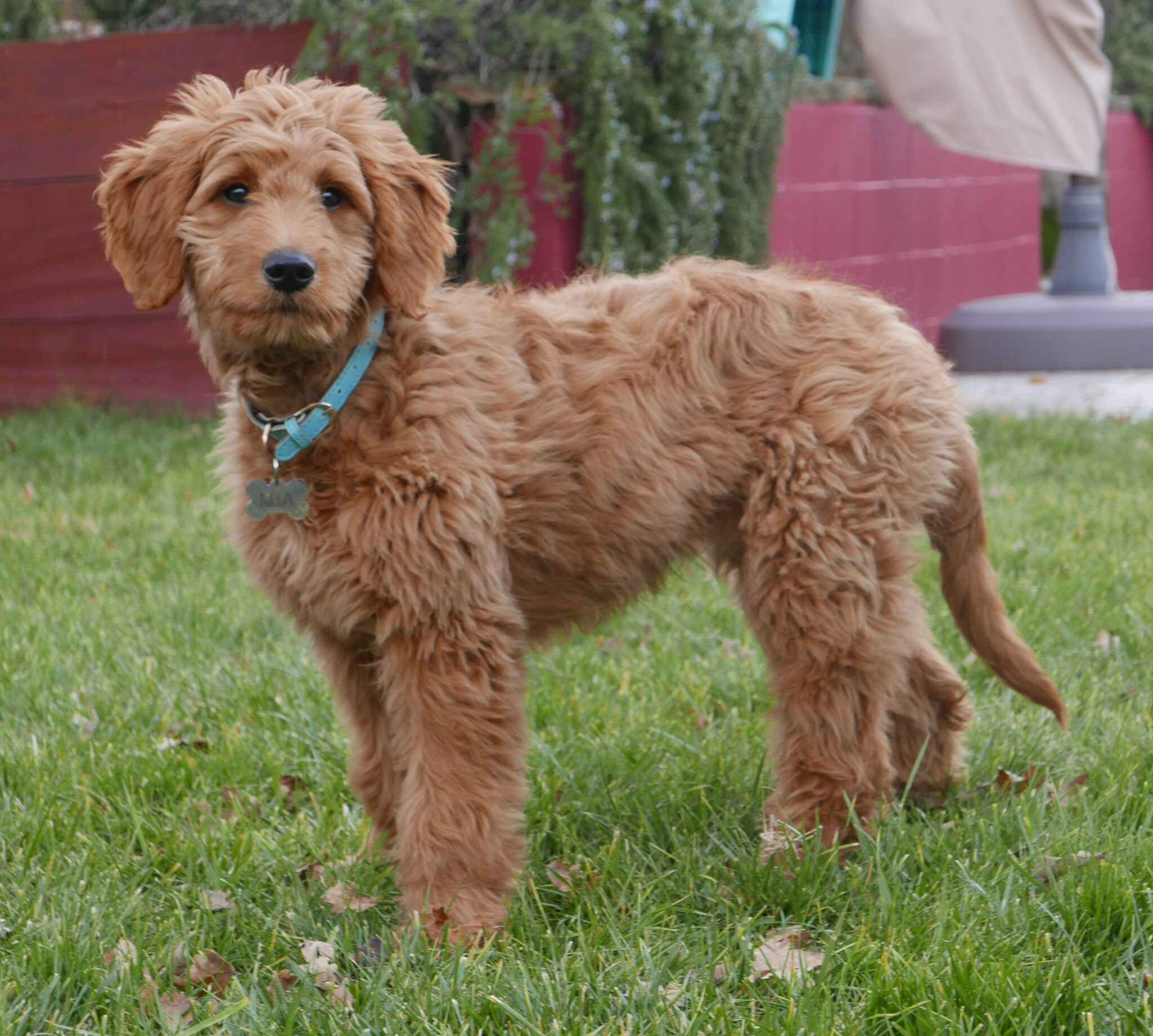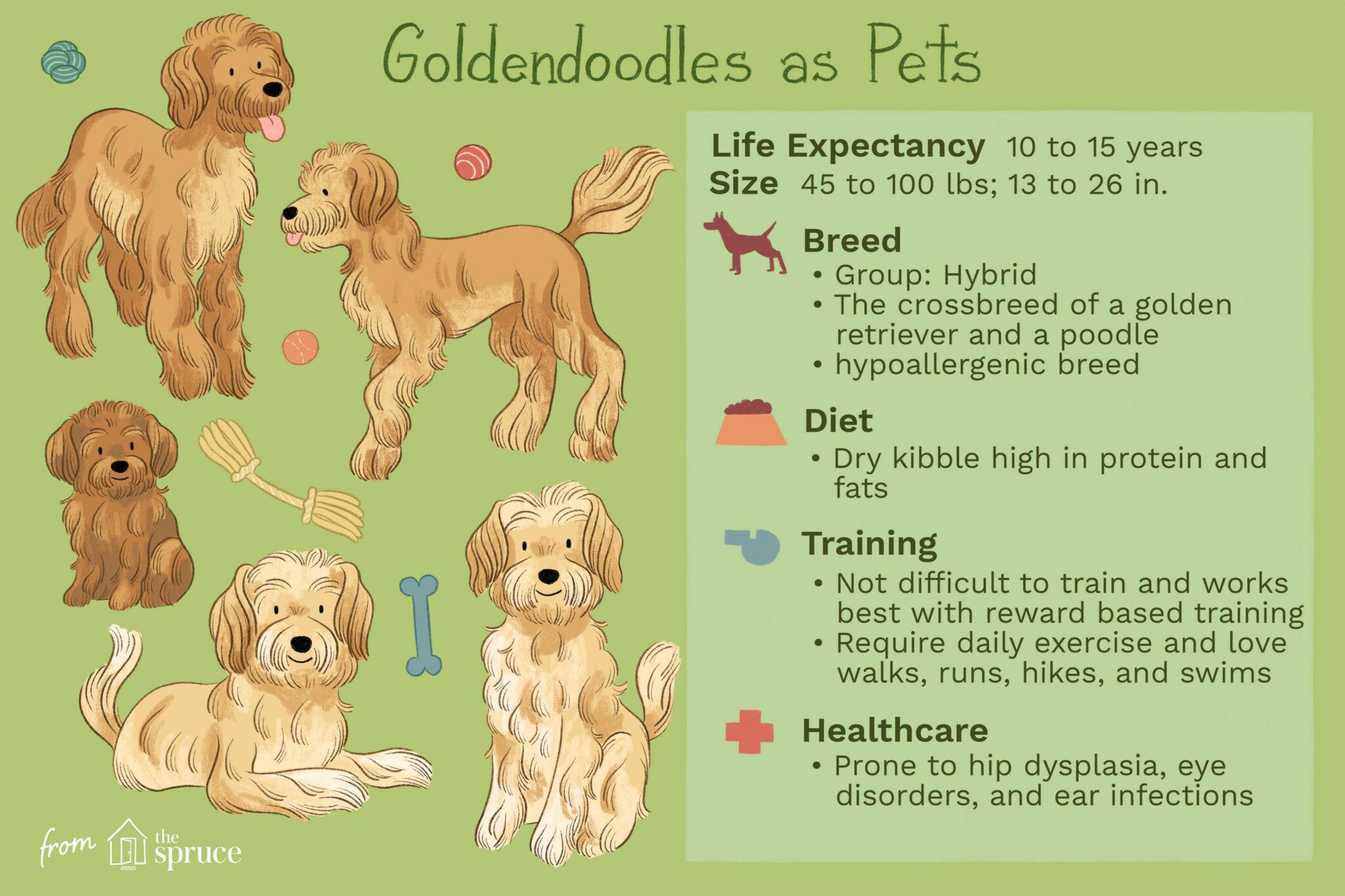When Can Male Goldendoodles Breed?
If you’ve ever wondered about when male Goldendoodles can start breeding, you’re in the right place! We’ve got all the information you need to know about this fascinating topic. So, let’s dive in and explore the world of Goldendoodles and their breeding journey.
Male Goldendoodles usually reach sexual maturity around six to twelve months of age. However, it’s important to note that breeding should only be considered when the dog has reached full mental and physical maturity. Keep in mind that every individual is unique, so it’s crucial to consult with a professional veterinarian to ensure you make the right decision for your furry friend.
So, whether you’re a curious pet owner or just interested in learning more about these adorable hybrid dogs, join us as we uncover the answer to the question, “When can male Goldendoodles breed?” Let’s embark on this exciting and informative adventure together!

Table of Contents
- When Can Male Goldendoodles Breed?
- Additional Information on Breeding Male Goldendoodles
- 6. Reproductive Health Assessments
- 7. Breed Compatibility
- 8. Responsible Breeding Programs
- 9. Preparing for Breeding
- 10. Genetic Testing
- 11. Reproductive Assistance
- 12. Health Testing Before Breeding
- 13. Breeding Contracts
- 14. Timing of Breeding
- 15. Patience and Monitoring
- 16. Prenatal Care
- 17. Post-Breeding Care
- 18. Whelping and Neonatal Care
- 19. Finding Suitable Homes for Puppies
- 20. Continuous Learning and Improvement
- Key Takeaways: When Can Male Goldendoodles Breed?
- Frequently Asked Questions
- What is the age at which male Goldendoodles can breed?
- What signs indicate that a male Goldendoodle is ready to breed?
- Is there an ideal breeding age for male Goldendoodles?
- Are there any health considerations for male Goldendoodles when it comes to breeding?
- Can a male Goldendoodle breed throughout its entire life?
- BREEDING OUR GOLDENDOODLE | STEP BY STEP PROCESS
- Summary
When Can Male Goldendoodles Breed?
Goldendoodles are a popular hybrid breed, known for their friendly nature, intelligence, and hypoallergenic coat. Many dog owners and breeders are interested in breeding Goldendoodles, but it’s essential to understand the proper timing for breeding male Goldendoodles. Breeding too early or too late can have negative consequences on the health and well-being of both the male and female dogs involved. In this article, we will explore the factors to consider and the optimal age for male Goldendoodles to breed.
1. Physical and Sexual Maturity
Before considering breeding, it’s important to ensure that male Goldendoodles have reached physical and sexual maturity. Typically, male dogs become sexually mature between 6 to 12 months of age. However, maturity can vary depending on the individual dog. It’s essential to consult with a veterinarian to assess the specific maturity level of your male Goldendoodle. Breeding a male that is not fully mature can lead to difficulties in reproduction and may produce offspring with health issues.
Once a male Goldendoodle has reached sexual maturity, they will display signs of interest in mating, such as increased mounting behavior, roaming, and scent marking. These behaviors indicate that the male is ready for breeding, but it’s important to wait for the optimal age to ensure the best chances of a successful mating and healthy offspring.
2. Age and Health Considerations
While male Goldendoodles may become sexually mature between 6 to 12 months, it’s generally recommended to wait until they are at least 18 to 24 months old before breeding. This allows the male to fully develop physically and mentally, ensuring they are in optimal health for breeding. Breeding a male dog before they are fully mature can lead to health complications and may result in smaller litter sizes or increased risks for the mother and puppies.
It’s crucial to prioritize the health of both the male and female Goldendoodles when considering breeding. Before breeding, ensure that both dogs have undergone thorough health screenings, including genetic testing for common breed-specific diseases. Breeding dogs with known health issues can lead to offspring inheriting these genetic conditions. Additionally, maintaining a healthy diet, regular exercise, and routine veterinary care are critical for male Goldendoodles to be in optimal breeding condition.
3. Breeding Responsibilities
When breeding male Goldendoodles, it’s important to approach the process responsibly and ethically. Being a responsible breeder means ensuring the health and well-being of both the male and female dogs, as well as the offspring. Breeding should be done with the intention of improving the breed and producing healthy, well-tempered puppies.
Before breeding, it’s essential to research and educate yourself about the breed, breeding practices, and responsible dog ownership. This includes understanding the potential risks and complications that can occur during the breeding process and being prepared to provide appropriate veterinary care and support to the mother and puppies.
Additionally, responsible breeders prioritize finding suitable homes for the puppies, conducting thorough screenings and interviews with potential buyers, and providing ongoing support and guidance to the new owners.
4. Benefits of Early Neutering
While breeding male Goldendoodles is a common desire for many dog owners, it’s important to note that not all dogs are suitable for breeding. Many experts recommend early neutering for male Goldendoodles that are not intended for breeding purposes. Neutering your male Goldendoodle at a young age has several benefits, including reducing the risk of certain health issues such as testicular cancer and prostate problems. Neutering can also help prevent unwanted behaviors, such as aggression and roaming. It’s crucial to discuss the decision of neutering with your veterinarian and consider the individual needs and circumstances of your Goldendoodle.
5. Consultation with a Veterinarian
When it comes to breeding male Goldendoodles, it’s always best to consult with a veterinarian who has experience in canine reproduction. They can provide personalized advice based on the specific needs of your dog and offer guidance throughout the breeding process. A veterinarian can assess the readiness and health of the male Goldendoodle, perform necessary health screenings, and provide information on the optimal timing for breeding.
Additional Information on Breeding Male Goldendoodles
Now that we have covered the optimal age and considerations for breeding male Goldendoodles, let’s explore some additional information on this topic.
6. Reproductive Health Assessments
Before breeding a male Goldendoodle, it’s essential to ensure their reproductive health is in excellent condition. This includes having your dog undergo a comprehensive reproductive health assessment, which may include physical examination, semen analysis, and testing for sexually transmitted diseases. These evaluations will give you valuable information about your dog’s fertility and overall reproductive health.
7. Breed Compatibility
When breeding a male Goldendoodle, it’s important to consider the compatibility of the breed. Goldendoodles are a cross between Golden Retrievers and Poodles, resulting in a unique mix of traits. When selecting a female for breeding, it’s essential to choose a compatible breed that complements the Goldendoodle’s temperament, size, and characteristics. Working with a knowledgeable breeder or veterinarian can help you make informed decisions about breed compatibility.
8. Responsible Breeding Programs
Participating in responsible breeding programs and organizations can provide valuable resources and support for breeding male Goldendoodles. These programs often require adherence to specific breeding standards, health testing, and ethical breeding practices. By joining a reputable program, you can connect with experienced breeders, access educational materials, and contribute to the improvement and preservation of the Goldendoodle breed.
9. Preparing for Breeding
Before breeding, it’s essential to make the necessary preparations for your male Goldendoodle. This includes maintaining a healthy diet, providing regular exercise and socialization, and ensuring they are up to date on vaccinations and preventive care. It’s also important to create a comfortable and safe environment for breeding, whether you choose natural mating or artificial insemination. Consulting with a veterinarian can provide guidance on creating the optimal conditions for successful breeding.
10. Genetic Testing
Genetic testing plays a crucial role in responsible breeding practices. By testing both male and female Goldendoodles for common genetic conditions and diseases, you can make informed decisions to avoid breeding dogs that carry or are affected by these conditions. Genetic testing can help reduce the risk of passing on hereditary issues to the offspring and contribute to the overall health and well-being of the breed.
11. Reproductive Assistance
In some cases, male Goldendoodles may require assistance with reproductive issues. They may experience difficulties in mating or have low sperm count or motility. In such cases, reproductive assistance methods, such as artificial insemination or fertility medications, may be necessary. Consulting with a veterinarian who specializes in canine reproduction can provide guidance on the appropriate reproductive assistance methods for your male Goldendoodle.
12. Health Testing Before Breeding
Before breeding a male Goldendoodle, it’s crucial to conduct health testing to ensure they are free from genetic disorders and health issues. This includes tests for hip and elbow dysplasia, eye disorders, heart conditions, and other breed-specific health concerns. By selecting a male with a clean bill of health, you can enhance the chances of producing healthy offspring and contribute to the overall health of the Goldendoodle breed.
13. Breeding Contracts
When breeding a male Goldendoodle, it’s common practice to have a breeding contract in place with the owner of the female dog. A breeding contract outlines the terms and conditions of the breeding arrangement, including financial agreements, responsibilities, and expectations. This contract ensures clear communication and protects the interests of both parties involved in the breeding process.
14. Timing of Breeding
Timing plays a vital role in the breeding process. It’s important to closely monitor the female dog’s heat cycle to determine the optimal time for breeding. This involves observing changes in her behavior, vaginal discharge, and using a canine progesterone test to pinpoint the most fertile period. Working with a veterinarian or reproductive specialist can provide valuable guidance on the timing of breeding to maximize the chances of a successful mating.
15. Patience and Monitoring
Breeding male Goldendoodles requires patience and careful monitoring. It may take multiple attempts to achieve a successful mating, especially if the timing is not precise. It’s important to be patient, remain diligent in monitoring the female’s heat cycle, and consult with a veterinarian if difficulties arise. With proper planning and patience, you can increase the likelihood of a successful breeding and ensure the health and well-being of the mother and puppies.
16. Prenatal Care
Prenatal care is crucial for the female Goldendoodle during the breeding process. As a breeder, it’s your responsibility to provide proper care, nutrition, and regular veterinary check-ups for the pregnant dog. This includes monitoring weight gain, ensuring a balanced diet, and providing appropriate supplements as recommended by the veterinarian. Proper prenatal care helps ensure the health of the mother and the development of healthy, robust puppies.
17. Post-Breeding Care
After successful breeding, it’s important to provide post-breeding care for both the male and female Goldendoodle. This includes maintaining a healthy diet, ensuring sufficient rest and exercise, and monitoring for any signs of discomfort or health issues. Regular veterinary check-ups, ultrasound scans, and hormone level monitoring can help detect any potential complications early on.
18. Whelping and Neonatal Care
Once the female Goldendoodle gives birth, it’s important to provide appropriate whelping and neonatal care. This includes creating a comfortable and clean whelping area, ensuring proper nutrition for the mother, and monitoring the health and development of the puppies. Breeding male Goldendoodles should be prepared to provide support and assistance to the mother and puppies throughout the whelping and neonatal period.
19. Finding Suitable Homes for Puppies
One of the most crucial aspects of responsible breeding is finding suitable homes for the puppies. It’s important to thoroughly screen potential buyers and ensure they are committed to providing a loving and suitable environment for the puppies. Conducting interviews, home visits, and background checks can help ensure that the puppies are placed in safe and caring homes. As a breeder, it’s also your responsibility to provide ongoing support and guidance to the new owners throughout the lifetime of the dogs.
20. Continuous Learning and Improvement
Breeding male Goldendoodles is a continuous learning process, and it’s important to stay informed about the latest research, breeding practices, and health advancements in the field. Actively engaging with the Goldendoodle breeding community, attending seminars, and participating in continuing education opportunities can help you enhance your knowledge and skills as a breeder. Continuous learning and improvement contribute to the overall well-being and betterment of the Goldendoodle breed.
In conclusion, breeding male Goldendoodles requires careful consideration and responsible practices. It’s essential to ensure that the male is physically and sexually mature, in optimal health, and free from genetic disorders before considering breeding. Consulting with a veterinarian who specializes in reproductive health and following ethical breeding standards will enhance the chances of successful breeding and the production of healthy, well-tempered puppies. By approaching breeding responsibly and prioritizing the health and well-being of the dogs involved, breeders can contribute to the preservation and improvement of the Goldendoodle breed.
Key Takeaways: When Can Male Goldendoodles Breed?
- Male Goldendoodles can start breeding around 6 to 8 months of age.
- It is important to wait until the male Goldendoodle is fully developed and physically mature before breeding.
- Health and genetic testing should be done prior to breeding to ensure the male Goldendoodle is free from any hereditary diseases or conditions.
- Consulting with a veterinarian is crucial to determine the appropriate time for breeding and to address any potential health concerns.
- Proper care and nutrition are essential to ensure the male Goldendoodle is in optimal breeding condition.
Frequently Asked Questions
What is the age at which male Goldendoodles can breed?
Male Goldendoodles can typically start breeding around 1 year of age. However, it is important to note that their physical and mental maturity can vary. Some male Goldendoodles may not be fully mature until they are 2 years old. It is recommended to consult with a veterinarian to assess the individual dog’s readiness to breed.
Early breeding can have negative consequences on the health and development of male Goldendoodles. Waiting until they are fully mature helps ensure that they are physically and mentally prepared for the responsibilities of breeding.
What signs indicate that a male Goldendoodle is ready to breed?
When a male Goldendoodle is ready to breed, he may display certain behaviors and physical changes. These can include increased interest in female dogs, mounting behavior, and marking territory with urine. Additionally, the male Goldendoodle’s testicles should have fully descended, and he should have reached his adult size and weight.
It is important to note that these signs may vary among individual dogs, and it is always best to consult with a veterinarian to determine if a male Goldendoodle is truly ready to breed.
Is there an ideal breeding age for male Goldendoodles?
While male Goldendoodles can start breeding around 1 year of age, there is no definitive ideal breeding age. It is important to consider the dog’s overall health, maturity, and breed standards before deciding to breed. Waiting until the male Goldendoodle is fully mature, both physically and mentally, can help ensure a successful breeding and the health of the offspring.
Breeding too early can increase the risk of complications and health issues for both the male and female dogs involved. Responsible breeders prioritize the well-being of their dogs and make informed decisions about when to breed.
Are there any health considerations for male Goldendoodles when it comes to breeding?
Yes, there are several health considerations for male Goldendoodles when it comes to breeding. It is important to ensure that the male dog is free from any genetic or hereditary health conditions that could be passed on to the offspring. Health tests, such as hip and elbow evaluations, should be conducted to assess the dog’s overall health and suitability for breeding.
Additionally, it is crucial to provide proper nutrition, exercise, and regular veterinary care to maintain the male Goldendoodle’s optimal health and fertility. Breeding should only be done with the guidance of a veterinarian and in accordance with responsible breeding practices.
Can a male Goldendoodle breed throughout its entire life?
Male Goldendoodles can breed throughout their lives, but as they age, their fertility may decrease. It is generally recommended to retire male dogs from breeding around 8 years of age. Breeding older dogs may increase the risk of health complications for both the male and female dogs, as well as the quality of the offspring.
Retiring male Goldendoodles from breeding allows them to enjoy their senior years in good health and reduces the chances of passing on genetic or hereditary health issues. It is important to prioritize the well-being of the dog and make responsible decisions regarding breeding as they age.
BREEDING OUR GOLDENDOODLE | STEP BY STEP PROCESS
Summary
So, to sum it all up, male Goldendoodles can breed once they reach sexual maturity, which is typically around 6 to 12 months old. However, it’s important to wait until they are fully grown and physically developed, which usually happens around 18 to 24 months of age. Breeding too early can lead to health problems for both the male Goldendoodle and the puppies.
It’s also crucial to consider the genetic health of the male before breeding. Conducting health tests and screenings can help ensure that the offspring will be healthy and free from inherited diseases. Responsible breeding practices, such as choosing a suitable mate and providing proper care, are essential to protect the well-being of the Goldendoodles and maintain the breed’s integrity.
Remember, breeding should only be done by experienced and knowledgeable breeders who prioritize the health and welfare of the dogs. If you are considering breeding a male Goldendoodle, seek guidance from professionals and consult with a veterinarian to make the best decision for your dog and the future puppies.



